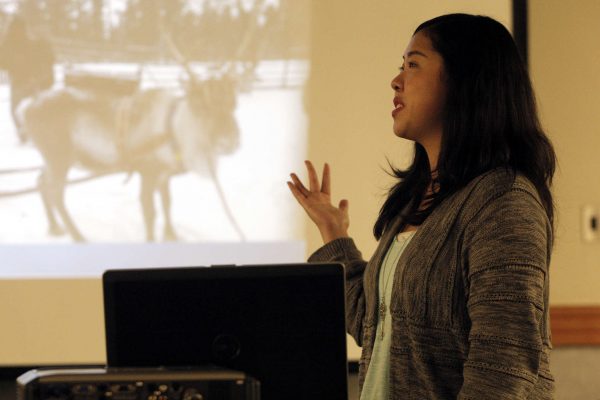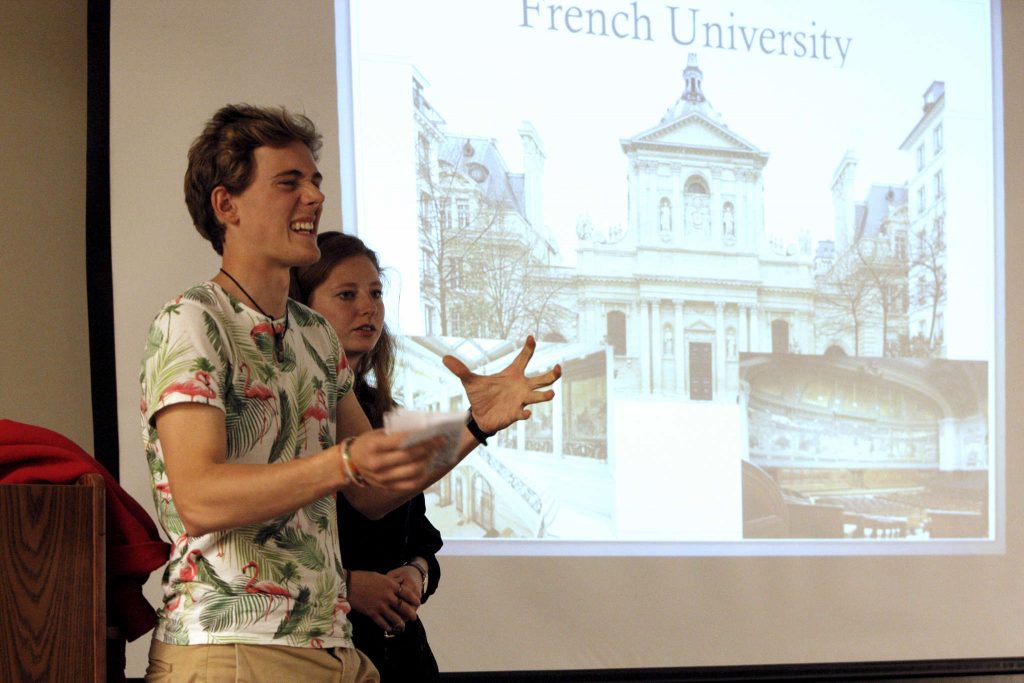[dropcap]O[/dropcap]scar Villagrana knew he had made it to the right place when he arrived in Amsterdam and saw large crowds of people cruising down walkable streets instead of the gridlocked traffic associated with large American cities.
A senior in SF State’s music program, Villagrana chose to study abroad in Amsterdam last academic year to immerse himself in the music of the city and engage in the bicyclist culture of Holland.
“They set the bar much higher when it comes to musicianship,” Villagrana said. “The biggest thing was that I was introduced to new bands, new composers and new complete genres that I don’t know how I would have run into otherwise.”
Villagrana was one of five panelists who discussed their experiences studying abroad during the World at a Glance: Europe presentation Monday at the Rosa Parks conference room. The panel was a part of the 15th annual International Education Week, which is designed to cultivate global relationships and promote international education programs throughout SF State.
Noah Kuchins, the coordinator for study abroad and international programs at SF State, said international education does not just mean sending people out — it also means bringing in students to enrich the University community.

“We have 2,500 international students at SF State that are creating a lot of diversity, offering a lot of viewpoints, and bringing their perspectives from their respective countries and upbringing,” Kuchins said. “I think that’s something that’s instrumental to what international education is supposed to mean.”
The first of many panels this week also included a short presentation from two international students from France. Auriane Denis-Loupof, who studies international relations at SF State, started by dispelling a few stereotypes about French life.
“Yes, we eat croissants, but it’s not every day,” Denis-Loupof said. “Mostly, we have like baguette and butter.”
Denis-Loupof spoke highly of the American higher education system during her presentation, noting that in France large class sizes make it difficult to build relationships with educators.
“The relationship between teachers and students here is amazing,” Denis-Loupof said. “Here teachers want to be friends. In France, your teacher is your teacher — there is a huge gap between you.”
President Bill Clinton organized the first International Education week in 2000 to celebrate the impact and benefits of international education. Today, more than 100 countries participate in the festivities worldwide, according to the State Department Bureau of Educational and Cultural Affairs webpage.
To celebrate, the University will host a culture fair in the quad, international lunches at City Eats Dining Center and Read About Your World in J. Paul Leonard Library every day this week in addition to films and panels on international topics.
The cinema department will screen Turkish films on Wednesday at 4 p.m. in Fine Arts 193 with David Selim Sayers, who helped create the Turkish Studies program at SF State.
Globalization Pressures in 21st century Latin America is set to discuss statistics and data regarding the impact of technology on the daily lives of people in the Latin America region in Rosa Parks Room D in the Cesar Chavez Student Center Thursday at 12 p.m.
City Eats will finish off its week of international lunches with a spread of Moroccan dishes at 11 a.m. Friday.
“The partnerships that we form are what I would call a way of marrying up,” Kuchins said. “We try to set up those partnerships to give our students the best academic opportunities overseas.”








Lance • Nov 19, 2014 at 11:20 am
Congrats to Kuchins and others because being an
international student isn’t easy, given our complex culture and language.
Assistance must come from numerous sources to aid these young people embarking
on life’s journey. A new award-winning worldwide book/ebook that helps anyone
coming to the US is “What Foreigners
Need To Know About America From A To Z: How to Understand Crazy American
Culture, People, Government, Business, Language and More.” It is used in
foreign Fulbright student programs and endorsed worldwide by ambassadors,
educators, and editors. It also identifies “foreigners” who became successful
in the US and how they contributed to our society, including students.
A chapter on education explains how to be
accepted to an American university and cope with a confusing new culture,
friendship process and daunting classroom differences. Some stay after
graduation. It has chapters that explain how US businesses operate and how to
get a job (which differs from most countries), a must for those who want to
work for an American firm here or overseas.
It also has chapters that identify the most
common English grammar and speech problems foreigners have and tips for easily
overcoming them, the number one stumbling block they say they have to
succeeding here.
Most struggle in
their efforts and need guidance from schools’ international departments,
immigration protection, host families, concerned neighbors and fellow
students, and books like this to extend a cultural helping hand so we all have
a win-win situation. Good luck to all
wherever you study!